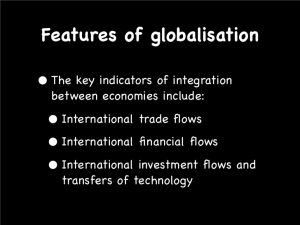Political Science Notes On – Features Of Globalisation – For W.B.C.S. Examination.
Globalisation refers to the integration of markets in the global economy, leading to the increased interconnectedness of national economies.Continue Reading Political Science Notes On – Features Of Globalisation – For W.B.C.S. Examination.
Markets where globalisation is particularly significant include financial markets, such as capital markets, money and credit markets, and insurance markets, commodity markets, including markets for oil, coffee, tin, and gold, and product markets, such as markets for motor vehicles and consumer electronics.Continue Reading
The globalisation of sport and entertainment is also a feature of the late 20th and early 21st centuries.
Why has globalisation increased?
The pace of globalisation has increased for a number of reasons:
- Developments in IT, transport and communications have accelerated the pace of globalisation over the past 40 years. The internet has enabled fast and 24/7 global communication, and the use of containerisation has enabled vast quantities of goods and commodities to be shipped across the world at extremely low cost.
- More recently, the rise of social media means that national boundaries have, in many ways become irrelevant as producers use new forms of communication and marketing, including micro-marketing, to target international consumers. The widespread use of smartphones has also enabled global shoppers to have easy access to ‘virtual’ global markets.
- The rise of new electronic payments systems,, including e-Wallets, pre-pay and mobile pay, e-Invoices and mobile pay apps, also facilitate increased global trade.
- Increasing em>capital mobility has also acted as a stimulus to globalisation. When capital can move freely from country to country, it is relatively straightforward for firms to locate and invest abroad, and repatriate profits.
- The development of complex financial products, such as derivatives, has enabled global credit markets to grow rapidly.
- Increased trade which has become increasingly free, following the collapse of communism, which has opened up many former communist countries to inward investment and global trade. Over the last 30 years, trade openness, which is defined as the ratio of exports and imports to national income, has risen from 25% to around 40% for industrialised economies, and from 15% to 60% for emerging economies.
- The emergence of footloose multinational and transnational companies (MNCs and TNCs) and the rise in the significance of global brands such as Microsoft, Apple, Google, Sony, and McDonalds, has been central to the emergence of globalisation. The drive to reduce tax burdens and avoid regulation has also meant the establishment of complex international business structures.
The advantages of globalisation
Globalisation brings a number of potential benefits to international producers and national economies, including:
- Providing an incentive for countries to specialise and benefit from the application of the principle of comparative advantage.
- Access to larger markets means that firms may experience higher demand for their products, as well as benefit from economies of scale, which leads to a reduction in average production costs.
- Globalisation enables worldwide access to sources of cheap raw materials, and this enables firms to be cost competitive in their own markets and in overseas markets. Seeking out the cheapest materials from around the world is called global sourcing. Because of cost reductions and increased revenue, globalisation can generate increased profits for shareholders.
- Avoidance of regulation by locating production in countries with less strict regulatory regimes, such as those in many Less Developed Countries (LCDs).
- Globalisation has led to increased flows of inward investment between countries, which has created benefits for recipient countries. These benefits include the sharing of knowledge and technology between countries.
- In the long term, increased trade is likely to lead to the creation of more employment in all countries that are involved.
Over-specialisation, such as being over-reliant on producing a limited range of goods for the global market, is a further risk associated with globalisation. A sudden downturn in world demand for one of these products can plunge an economy into a recession. Many developing countries suffer by over-specialising in a limited range of products, such as agriculture and tourism.
Globalisation generates winners and losers, and for this reason it is likely to increase inequality, as richer nations benefit more than poorer ones. The awareness of rising inequality, along with job losses, has been argued to have contributed to the rise in anti-globalisation movements.
Increased trade associated with globalisation has increased pollution and helped contribute to CO2 emissions and global warming. Trade growth has also accelerated the depletion of non-renewable resources, such as oil.
Please subscribe here to get all future updates on this post/page/category/website


 +919674493673
+919674493673  mailus@wbcsmadeeasy.in
mailus@wbcsmadeeasy.in







































































































